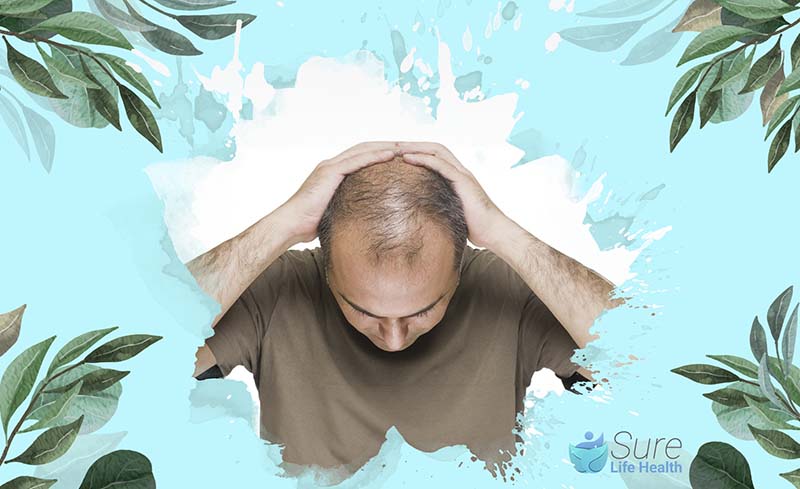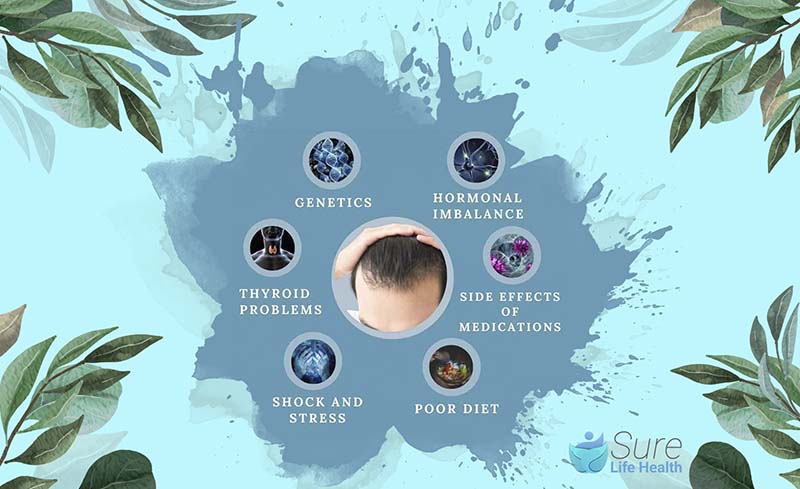Understanding the link between testosterone and hair loss can be tricky, especially when it comes to debunking common beliefs. Contrary to what many think, being bald doesn’t necessarily mean having high testosterone levels.
Male pattern baldness, known as androgenic alopecia, affects a lot of people, with around 50 million men and 30 million women experiencing it in the United States alone, according to the National Institutes of Health (NIH). Hair loss happens because hair follicles shrink over time, messing up the natural hair growth cycle.
Eventually, new hairs become thinner and thinner until the follicles stop producing hair altogether. Hormonal changes and genetic factors are the main reasons behind this process. Does testosterone make you go bald ? Keep reading to uncover more insights.
Does Testosterone Make You Go Bald?
Hair loss isn’t directly caused by either high or low testosterone levels. Instead, it’s more about how sensitive your hair follicles are, which is largely determined by your genes. When hair follicles shrink, hair becomes thinner until it eventually stops growing altogether, leading to what’s known as androgenic alopecia. This condition affects both men and women, but it’s more common in men.
In androgenic alopecia, hair loss typically progresses through stages. It usually starts with a thinning of the front hairline, forming an M-shape. Then, hair starts thinning on the top of the head, resulting in a receding hairline and bald spot at the crown. Eventually, these areas merge, leaving only a horseshoe-shaped ring of hair around the sides and back of the head.
The biggest risk factor for androgenic alopecia is having a family history of the condition, not the level of testosterone in your body. High testosterone levels can lead to increased production of a hormone called DHT, which can weaken hair follicles and cause hair loss. However, it’s important to note that testosterone levels don’t determine how sensitive your hair follicles are to DHT. Some people are genetically predisposed to have hair follicles that are more sensitive to DHT, which means high DHT levels can speed up the hair loss process.
Notes: While testosterone isn’t the sole culprit behind baldness, it can indirectly contribute to hair loss by increasing DHT levels. However, genetics play a bigger role in determining how sensitive your hair follicles are to DHT. If you’re concerned about hair loss, it’s a good idea to talk to a doctor who can provide personalized advice and treatment options.

How Are Testosterone and Baldness Related?
Understanding the connection between hair loss and sex hormones, particularly androgen hormones like testosterone, is quite complex.
These hormones can influence the hair cycle and follicle structure differently depending on where the hair is located on the body. While androgens often stimulate hair growth in areas like the
face, armpits, pubic region, and chest, they tend to inhibit hair follicles on the scalp. This intriguing phenomenon highlights the intricate nature of the relationship between testosterone and hair growth, emphasizing the importance of continued scientific research in this area.

Other Factors Cause Hair Loss
Several factors can contribute to thinning hair or hair loss:
- Genetics: Inheriting genes that make hair follicles prone to shrinking and thinning can increase the risk of hair loss. A family history of pattern hair loss on either side can predispose individuals to this condition.
- Age: Hair growth naturally slows down with age, and many hair follicles may stop producing new hair over time. Alongside hair thinning and loss, changes in hair fiber diameter, density, and color may occur.
- Nutrient Deficiency: Micronutrient deficiencies, such as iron, zinc, biotin, and magnesium, can impact hair health and contribute to hair loss or hinder recovery from hair loss disorders.
- Alopecia Areata: This rare condition occurs when the immune system attacks hair follicles, resulting in scalp or body hair loss.
- Pregnancy and Childbirth: Hair loss after childbirth, often due to a drop in estrogen levels, is common and usually temporary, according to the American Academy of Dermatology Association (AAD).
- Medications/Treatments: Certain medications or treatments, including some cancer therapies and arthritis medications like Arava (leflunomide) and methotrexate, may lead to hair loss.
- Hair Care Products and Styling Methods: Chemicals in hair care products like shampoos and styling practices such as dyeing and straightening can cause hair loss, contact dermatitis, chemical burns, or scarring.
- Stress and Illnesses: Hair loss can be triggered by stress, and various medical conditions such as thyroid disease, scalp infections, and plaque psoriasis can also contribute to hair loss.
Understanding these factors can help individuals take proactive steps to address and manage hair loss concerns effectively.

How Can You Treat Hair Loss Caused by Fluctuating Testosterone Levels?
Discovering effective treatments for hair loss induced by fluctuating testosterone levels offers hope and relief to many individuals grappling with this concern. Below, we’ll outline some of the treatments available for addressing this issue:
Biotin
A derivative of Vitamin B, biotin aids in converting nutrients into energy, which cells need to function optimally. It also promotes the production of keratin, a protein crucial for hair structure.
Studies suggest that biotin supplementation can enhance hair growth and prevent hair loss.
Minoxidil
This topical medication enhances blood flow to hair follicles, prolonging their lifespan and sometimes stimulating new growth.
Pumpkin Seed Oil
Research indicates that pumpkin seed oil may benefit men experiencing male pattern baldness by improving hair loss. It functions as a DHT blocker, preventing hair thinning and loss.
Finasteride
Available as a prescription tablet, finasteride works by inhibiting the conversion of testosterone into DHT, the hormone responsible for male pattern hair loss.
B Vitamins
B vitamins, including biotin, play essential roles in hair health. Incorporating foods rich in B vitamins or taking supplements can support overall hair health and growth.
These treatments offer viable options for addressing hair loss associated with fluctuating testosterone levels. However, consulting a healthcare professional before starting any treatment regimen is advisable for personalized guidance and to ensure safety and effectiveness.
Conclusion
Hair loss resulting from fluctuating testosterone levels is often linked to male pattern baldness. Testosterone contributes to the production of dihydrotestosterone (DHT), a hormone implicated in male balding.
Some men experience hair loss due to either genetic sensitivity or high levels of DHT. Medications can effectively block DHT from causing further hair loss. In more severe cases, hair transplant treatments can restore hair density and appearance.
By understanding the root causes of hair loss and exploring available treatments, individuals can effectively manage this issue. Consulting with a healthcare professional is key to finding the best approach tailored to individual needs and preferences.
Be sure to explore more insightful blogs from Sure Life Health, where we continue to shed light on the latest trends and breakthroughs in health and wellness.
Professor Gaye Cunnane, PhD, MB, FRCPI
As the Director of Health and Wellbeing at RCPI, Professor Gaye Cunnane is at the helm of initiatives aimed at enhancing the health and well-being of RCPI Trainers and Trainees. Her role extends beyond administration; she is also a respected clinical professor of rheumatology and a consultant rheumatologist at Trinity College Dublin (TCD) and St James’s Hospital. Prof. Cunnane’s medical journey began at TCD, where she graduated from medical school, and her path has been marked by both clinical and academic excellence.
After completing her basic clinical training in medicine, she embarked on PhD studies at University College Dublin and St Vincent’s University Hospital. Her research during this period was focused on prognostic markers in early inflammatory arthritis, a project that saw her collaborating with esteemed universities across Europe, including in Switzerland, The Netherlands, the UK, and Sweden.
Prof. Cunnane’s career took her to the University of California, San Francisco, where she spent three years delving into research on new treatments for lupus. Her academic prowess led her to the University of Leeds in 2001 as a senior lecturer, before returning to Ireland in 2003 to assume her current roles. She has also served as the National Specialty Director for Rheumatology training in Ireland, Programme Director for Basic Specialist Training with RCPI, and as a past President of the Irish Society for Rheumatology.
PUBLISHED ARTICLES
“Rheumatic disease differentiation using immunoglobulin G sugar printing by high-density electrophoresis”: Published in The Journal of Rheumatology, this study reflects her in-depth investigation into rheumatic diseases.
“Benefits of exercise in patients with rheumatoid arthritis: a randomized controlled trial”: This research work, highlighting the positive impact of exercise on rheumatoid arthritis, underscores Prof. Cunnane’s dedication to practical, patient-centered research.
Additionally, Prof. Cunnane has made notable contributions to the Annals of the Rheumatic Diseases, discussing early referral, diagnosis, and treatment of rheumatoid arthritis. She has also been involved in a study on the NCBI platform investigating exercise benefits in rheumatoid arthritis patients.
Professor Gaye Cunnane’s career is a testament to her commitment to improving patient outcomes in rheumatology through rigorous research, clinical excellence, and dedicated teaching. Her work continues to influence the field of rheumatology, both in Ireland and internationally.

